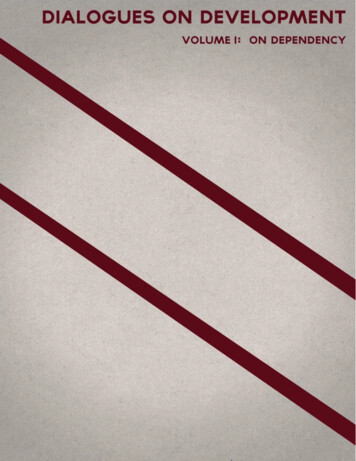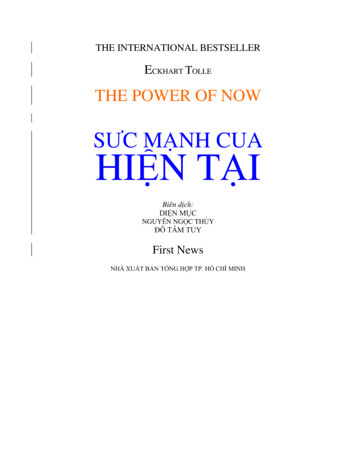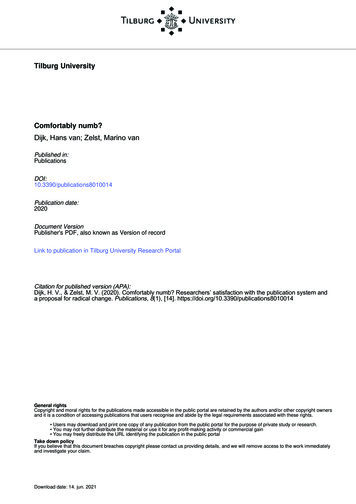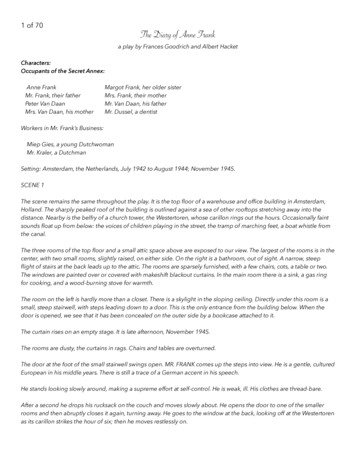
Transcription
Cover design: Minh Van2017This project was conducted under the aegis of the Economic Development WorkingGroup of the Young Scholars Initiative (YSI) of the Institute for New Economic Thinking(INET). tiativeISSN: 2472-6966External reviewersMany thanks to our external reviewers, Farzana Chowdry and Raymond Xu.Copy editingWe are grateful to the members of the YSI community who volunteered to copy-edit thisproject. These are: Paige Barclay, Florian Carl, Woody Wong Espejo, Aabid FirdausiM.S., Professor Sachin Ghai, Edwin Diaz Gonzalez, Nabila Islam, Clarrise Ng MayKymm and Sibanengi Ncube.
Table of ContentsThe IntervieweesiThe EditorsiPrefaceiiIntroduction: Why Should We Discuss Dependency Theory Today?vi1. A Dependency Pioneer12Samir Amin2. Dependency Theory: Its Enduring Relevance18Adebayo O. Olukoshi3. The Relevance of Dependent Development Then and Now27Peter Evans4. Whither Dependency Theory?34Sabelo Ndlovu-Gatsheni5. The Caribbean Plantation Economy and Dependency Theory42Rex McKenzie6. A Theoretical Revolution in Time and Space49Ramón Grosfoguel7. The Informal Empire of London60Andy Higginbottom8. The Political Economy of Africa and Dependency Theory67Patrick Bond9. Dependency Theory Today72Miguel Angel Centeno10. The More Things Change, the More They Stay the Same79Ian Taylor11. Dependency Theory Is Alive in Different Guises86Matías Vernengo12. Dependency Theory and Chinese Special Economic Zones in Africa93Honita Cowaloosur13. Varieties of Dependence in Europe99László BrusztBibliography106
DedicationTo the pioneers of dependency theory
The IntervieweesSamir Amin, Director, Third World ForumPatrick Bond, Professor of Political Economy, University of WitwatersrandLászló Bruszt, Professor of Political Science, Central European University (CEU)Miguel Angel Centeno, Professor of Sociology, Princeton UniversityHonita Cowaloosur, Manager of the Africa Division at Enterprise MauritiusPeter Evans, Professor Emeritus of Sociology, University of California, BerkeleyRamón Grosfoguel, Associate Professor of Latino/Chicano Studies, University ofCalifornia, BerkeleyAndy Higginbottom, Associate Professor of Politics and Human Rights, KingstonUniversityRex McKenzie, Lecturer in Economics, Kingston UniversitySabelo J. Ndlovu-Gatsheni, Professor of Development Studies, University of SouthAfricaAdebayo O. Olukoshi, Director, Africa and West Asia, International IDEA,Distinguished Visiting Professor, University of JohannesburgIan Taylor, Professor of International Relations and African Political Economy,University of St AndrewsMatías Vernengo, Professor of Economics, Bucknell UniversityThe EditorsUshehwedu Kufakurinani, Chair of the Department of Economic History,University of ZimbabweIngrid Harvold Kvangraven, PhD student in Economics, The New SchoolFrutuoso Santanta, MA student in Economics, The New SchoolMaria Dyveke Styve, PhD student, ERC Egalitarianism project, Department ofAnthropology, University of Bergeni
PrefaceJimi AdesinaProfessor Jimi Adesina holds the South African Research Chair in Social Policy, at theCollege of Graduate Studies, University of South AfricaThe 1980s marked a distinctly new phase in the socio-economic experience of manycountries, not least for the countries of sub-Saharan Africa. The impacts of theascendance of Neoliberalism—the ‘Washington Consensus’—created a familiar butheightened narrowing of policy space for many countries. The global impact ofstabilization and liberalization policies might in the North have had the effect of reiningin collective social welfare provisioning and restraining the labour movements. In theSouth, and most pointedly in sub-Saharan Africa, it meant the closing down of the spacefor what Samir Amin called (in this volume) a “sovereign project” of seeking anautonomous development path, severe state retrenchment, and social dislocations. Theeffort (and it could only be an effort) to commoditize every conceivable domain of socioeconomic life, placed the market at the heart of resource allocation and socialprovisioning. The most ambitious effort by African states to redress the crisis ofinherited colonial political economy, the Lagos Plan of Action and the Final Act of Lagos(1980) was countered by the Berg Report (1981).1 The Report claims to build on theLagos Plan of Action, but nothing could be further from the truth.The next two decades would witness the dismantling of the embryonic efforts atcollective social provisioning, and the retrenchment of national institutions focused on asemblance of autonomous development. A new army of functionaries of the BrettonWoods Institutions, bilateral agencies, and consultants would turn inside out thepolicymaking space and public institutions on the continent. It was like watching acolonial scenery all over again but without the political responsibility of administeringthe territory for the colonizing force. Alongside the closing of economic space was a1World Bank, Accelerated Development in Sub-Saharan Africa: An Agenda for Action ( Washington DC.: TheWorld Bank, 1981).ii
fundamental restructuring of mechanisms for knowledge production anddissemination—all immersed in the logic that there is no alternative to the market andthe liberal ordering of society. From the fledgling efforts at constructing developmentalstates in many countries the restructuring of the state into the "night-watchman state"focused on easing the "burden of doing business." New regimes of trade regulation andinvestment protection in the context of a unipolar international order operated intandem with more brazen efforts of the Western powers to impose their will on othercountries militarily and by covert efforts, and increased intellectual hegemony. Mostexplicit in Economics but evident in other fields as well, the plurality of public discoursebecame narrow and constrained. Market hegemony was coupled with the perceiveddeath of the emancipatory project. The fracturing and subordination were not simplybetween countries but deep within national boundaries, as well.The features were both familiar and new. Kwame Nkrumah’s Neocolonialism: the LastStage of Imperialism (1965)2 sums up quite well some of the multi-dimensional aspectsof what would later be described as Dependency and more recently Coloniality—the endof colonial rule did not mark the end of colonial domination. “The methods of neocolonialists are subtle and varied. They operate not only in the economic field but also inthe political, religious, ideological and cultural spheres.” Neither is the mechanism ofneo-colonialism at the level of state-to-state relations; it covers the operations oftransnational corporate entities, cultural entities, etc. The book, it should be recalled,was published while Nkrumah was the sitting president of Ghana; it earned a promptrebuke from the US State Department and the cancellation of “ 25million of American‘aid’ to Ghana.”3For many countries, the restructuring that emerged would tilt back to commodityproduction (mineral and non-mineral) and de-industrialization of the limited effort atindustrialization. For all the claim of renewed economic performance from sub-SaharanAfrica4 to Brazil, much of this was hitched to the commodity super-cycle. The engine forthis might be the resurgent China, but the implications for the location of theseeconomies in the global economic order (peripheral and extraverted) could not be moreobvious. If the pre-neoliberal era involved attempts at internalizing the growth enginesof many of these countries, the neoliberal era has been a period of heightenedextraversion.2Kwame Nkrumah, Neocolonialism: The Last Stage of Imperialism (London: Panaf, eo Colonialism (Accessed 20 May 2017).4 In December 2011, The Economist proclaims "Africa Rising"—"the hopeful continent"—after declaring thecontinent "Hopeless Africa" eleven years earlier (11 May 2000 issue of The Economist).3iii
But there are new mechanisms of enforcing compliance. Beyond gunboat diplomacy andideational domination, transnational capital’s regime of structuring the global economyinvolves rating agencies as instruments for restraining autonomous policymaking. Themore integrated and interlocking the domestic economy is with the centres of the globalfinance the more the leverage on countries that are in the positions of the so-called “subimperial powers.”Paradoxically, at a time when the core arguments of the Dependency framework aremost pertinent, they disappeared from mainstream debates on “globalization” and theacademic curricula. It is in this context that the inspiration for this collection ofinterviews with some of the leading scholars around the world is most welcome. Theproject of rethinking the world order, and the Young Scholars Initiative to explore theDependency framework through the interviews, opens an earlier archive to a newgeneration of intellectuals, activists, and policymakers (hopefully).As is evident from the interviews in this volume, Dependency was never a ’theory’ andboth its characterisation and critique can be quite clichéd. Its intellectual heritagestretched back to the 19th-century resistance against colonialism; its 20th-centuryproponents range from Raúl Prebisch to Adebayo Adedeji. The diversity of theframework (eloquently summarised by Samir Amin in this volume) shared a commonpremise of historical analysis and an understanding of the object of analysis as global.The differential location of countries within the system helps in understanding not onlythe global flow of value but other domains of dependence. The different strands—as theinterviews in this volume demonstrate—provide different levels of understanding of themechanisms of dependence and the feasibility of overcoming it. The forces driving andentrenching dependence are not only global or metropolitan; they are local as well. If inthe 1960s and the 1970s, the contention was between socialism and national bourgeoisdevelopment (‘dependent development’) in resolving the crisis of dependence, SamirAmin’s enunciation on the “sovereign project” remains central. Here, Ian Taylor’selaboration (in this volume) of Amin’s idea of “delinking” should help mitigate againstthe casual denunciation of the notion. It takes us beyond the pessimism of absolutes.History is not destiny, and policy space exists that can and should be explored, as it doesfor addressing racism, sexism, and epistemic dependence. Ideas matter so do policy andleadership.As noted earlier, for a new generation of scholars and students, this volume should be akey that opens the door to an archive and a new way of reasoning about the currentglobal order. The solution to a problem starts with an in-depth understanding of thenature of the problem. However, this goes beyond “new economic thinking.” As Ramóniv
Grosfoguel, (in this volume) shows and Nkrumah (as cited earlier) understands, what isat stake is more than the economic. What is required is thinking and acting on themulti-dimensional faces of dependence and what Grosfoguel called the “civilizationalcrisis.” The dependence is as much economic, as it is political, sociational, andepistemic, among others. It would require confronting the different dimensions ofdomination and dependence.City of Tshwane, South Africa23 May 2017v
Introduction: Why Should We DiscussDependency Theory Today?Why write a book about dependency theory today? Most economics students have eithernever encountered the theory in their curriculum, or have only heard of it as a theoryemployed in the past. As a group of young scholars interested in how global economicstructures and historical conditions influence the political economy of developingcountries, we want to explore what relevance dependency theory can have today. Withthe rise of neo-classical economics in the 1980s, dependency theory becamemarginalised and was ultimately cast aside. This happened despite its popularity in themid-20th century, particularly in the Global South. Using this collection of interviewswith various scholars, we hope to inspire students and academics to revisit the keytenets of dependency theory and consider how some of the original work can be used toexamine the persistence of global inequalities today.Dependency theory grew influential in Latin America in the 1960s and 1970s, largely inreaction to modernisation theory and free trade policies, which originated in the West.The proponents of modernization theory claimed that underdeveloped countries wereheld back by certain cultural characteristics, or their lack of adherence to specificeconomic policies that followed given “stages of growth”. While a variety of perspectivesexisted within the broad school of dependency theory, they all rejected modernisationtheory’s ahistorical approach to development and criticised its failure to account for theimportance of the role of global economic and political structures.One of the key tenets of dependency theory is its attention to the role of history and, inparticular, the role of colonialism in constructing the positions of different countrieswithin the global economy. Analysis of why a country occupies a certain position withinthe world economy should therefore begin at the global level. Dependency theoristsargue that, beyond the end of formal colonialism, the value transfers of profits havecontinued to flow from the Global South to the North. This implies that the “corecountries” of the North continue to benefit from their extraction of wealth from the“peripheral countries” of the South. Within such a framework, the underdevelopment ofcountries in the South can be explained via their continued exploitation at the hands ofthe North, rather than only by way of internal policy failures.vi
At this point, however, the different strands of dependency theory begin to diverge.Those who follow Andre Gunder Frank’s theory of “the development ofunderdevelopment” argue that development in core countries always producesunderdevelopment and poverty in the periphery. On the other hand, the proponents of“dependent development,” following Cardoso and Faletto, and Peter Evans, argue that,with the right policies (albeit not those recommended by modernisation theorists), alimited form of developmental catch-up is possible within the system. Dependencytheory also encompasses world systems theorists and structuralists. And, in fact, someregard dependency theory as more of an approach than a theory, which becomesapparent upon reading some of the interviews in this collection.With the interviews contained in this book, we aim to explore the degree to whichdifferent strands of dependency theory can explain underdevelopment. In particular,we want to develop an understanding of the theoretical elements academics find usefultoday, as well as examine their limitations. While we tried to engage with as manyscholars and major theorists who employ dependency theory as possible, we could notobtain interviews with all of them. The collection should therefore be considered as awindow into some possible ways of thinking about dependency theory’s relevance today,rather than a complete overview.Dependency Theory: Tensions and ContradictionsOur contributors disagree on a number of key fault lines when it comes to bothanalysing the mechanisms that sustain relations of dependency and the possible ways ofchanging these relations.Divergences emerge on fundamental questions about the nature and history ofcapitalism. For instance, Samir Amin argues that capitalism only took on its fulleconomic form with the industrial revolution in England, and politically with the Frenchrevolution. Dependencia scholars, however, go back to the start of colonisation in the1500s to examine the roots of the capitalist nature of Latin American countries, andtheir position as peripheral economies as they were integrated into the world economy.Nonetheless, Amin and dependencia theorists agree that the way Latin Americancountries were positioned as peripheries within the global system made it difficult forthem to catch up with advanced countries.Another fault line lies in how the different scholars we interviewed interpreteddevelopment, and the extent to which development is possible under capitalism. Some,like Ian Taylor, argue that industrialisation is necessary and that the capacity toindustrialise is still available, pointing to Ethiopia as an example. Others, such as Petervii
Evans, argue that industrialisation no longer provides adequate employmentopportunities, and that the development of service sectors offers more potential in termsof job-creation. Yet others, such as Samir Amin, emphasise other aspects ofdevelopment such as national autonomy, rather than simple (peripheral)industrialisation, while Ramón Grosfoguel argues that the term ‘development’ itself isinherently problematic, and that economic development is not possible within thecurrent system at all.Whether the key mechanisms that underpin relations of dependency are primarilyeconomic or if political, social and epistemic mechanisms are equally important, is alsoan area of tension between the scholars in this book. On the one side, we find PatrickBond, who argues that we need to understand the material conditions of the system toanalyse the causes of the reproduction of African poverty. On the other side of thespectrum, we find Ramón Grosfoguel, who argues that reducing the analysis to examineonly economic and material conditions is a fatal mistake. He argues that the systemneeds to be analysed as a whole. For instance, sexism and racism are among itsorganising principles, just as capitalist profit-seeking is. Thus these various inequalitiescannot be disentangled from one another. Sabelo J. Ndlovu-Gatsheni echoes similarsentiments in his discussion of decoloniality, an approach that builds on, but also goesbeyond, the dependency framework. Ndlovu-Gatsheni indicates that dependency theorywas limited by its Marxist outlook, which did not accommodate epistemological andideological dependencies that contribute to underdevelopment in the Third World.Furthermore, the role that local elites play in perpetuating relations of dependency isbrought up in the interviews with Rex McKenzie, Sabelo Ndlovu-Gatsheni and MiguelCenteno. Both McKenzie and Ndlovu-Gatsheni draw on Franz Fanon when consideringhow colonial systems and mind-sets are reproduced by local elites after formalindependence. This is another example of looking beyond economic structures tounderstand relations of dependency.The relationship between the local and the global is another point of contention, or atleast a topic where the differences in emphasis by the interviewed scholars becomeapparent. While all agree that there is a dialectic relationship between the global andlocal, there is disagreement regarding the strength of global structures, which form thecontext within which countries operate. This, then, has implications for how thesescholars view the possibility of changing a country’s position within the world economy.While most consider global structures to be crucial to perpetuating dependence, manystill propose solutions along national, rather than global, lines (Evans and Grosfoguelare the only scholars, among those interviewed, that explicitly propose solutions at theviii
global level). This is a contradiction inherent in much of dependency scholarship.When it comes to the question of whether it is necessary to break with relations ofdependency, and if so, whether this is possible and how it can be done, the scholarsinterviewed take different views. Peter Evans, for example, argues that there is a need tochange the global rules of trade and investment, and that the strengthened position ofcountries like China and Brazil has meant that developed countries can no longerdominate the rule-making processes. Vernengo, on the other hand, argues that buildingstrong and effective domestic institutions can drive improvements for people indeveloping economies, even within a structure of dependent development. Meanwhile,Samir Amin emphasises the importance of national popular projects, and the potentialfor delinking to create space for more autonomous development. Amin’s idea ofdelinking is not synonymous with autarky, but refers to a project that aims to compelthe system to adjust to peripheral needs, rather than adjusting to align with the needs ofthe core. The call for more radical solutions comes from Ndlovu-Gatsheni andGrosfoguel, who, through the analytical lens of decoloniality, call for moving beyondWestern-centric modernity. Ndlovu-Gatsheni describes this as a move to “depatriarchalise, de-racialise, de-tribalise, decolonise, de-imperialise and democratise”.Related to the issue of breaking from dependence is the discussion of the few countriesthat have managed to make the transition from periphery to core. The rise of the EastAsian countries is highlighted in almost every interview. Evans explains the rise of SouthKorea through its comprehensive development strategy, including redistribution ofland, human capital, and indicative industrialisation (“dependent development”).Others, such as Vernengo and Amin, argue that the rise of South Korea was onlypossible due to US support, resulting from the communist threat of North Korea.Notably, Evans does point out that the context within which South Korea now findsitself leaves it with little room to manoeuvre. He also notes that the country’s ability tocontinue to deliver social protection is limited, and therefore does not consider SouthKorea to represent a viable development path for other periphery countries to follow.Vernengo also highlights the US as a historic example of a less developed, raw materialsexporter that managed to obtain a dominant position in the world system, with theemergence of the dollar as the international reserve currency. The cases of South Koreaand the US appear exceptional, as they did not face limitations in the form of globalexploitative structures, which periphery countries are currently dealing with.Critiques of Dependency Theory Emerging From This CollectionMost of the scholars interviewed point to areas where dependency theory needs to beexpanded or refined. For Adebayo Olukoshi, the main limitation of what wasix
mainstream dependency theory was an acute poverty of class analysis and a tendency totreat underdeveloped countries as a collection of homogeneous units, without attendingto the complex class relations underpinning both domestic and global accumulationprocesses.Grosfoguel and Ndolvu-Gatsheni argue that decoloniality builds on the key tenets ofdependency theory, while also expanding it to include other key elements such asracism and sexism, in order to inform a fuller understanding of the logic of the currentworld system. Grosfoguel also mounts a critique of dependency theorists for a lack ofconsistency between their diagnosis of the problem and the solutions offered. Whilethese scholars emphasised the importance of global structures in the continuedexploitation of the South, they still considered the nation-state the necessary locus ofaction for challenging these global structures. Grosfoguel argues that the solutions needto be global if the roots of the problems are global. Local and national actions arenecessary for change to occur, but they are not sufficient by themselves.Some Unorthodox ApplicationsWhile dependency analysis tends to be confined to the study of economic relationsbetween the Western core and the Third World periphery, a number of less commonapplications emerge from the interviews. For example, Bond emphasises the usefulnessof dependency theory when analysing emerging South-South relations and thedominance of BRICS. Bond argues that the BRICS-countries operate as “sub-imperialsheriffs” of world imperialism, and that South Africa, for instance, has used its regionalinfluence to legitimise multilateral institutions, which represent the interests of theNorth, within Africa. Honita Cowaloosur emphasises the complex nature of how Chinesespecial economic zones function in Mauritius and several other African countries. Sheillustrates how Gunder Frank’s conceptualisation of core and periphery is useful in thisanalysis, but notes that it must be adapted to understand the Chinese operations.Furthermore, McKenzie points to how the plantation economy in Caribbean countriescan usefully be conceptualised through a dependency lens, and how the notion of theplantation as a “total institution” is insightful when analysing the current challenges inthe region. László Bruszt highlights the usefulness of dependency theory when analysingintra-European relations after the Cold War. He argues that the peripheral positions ofmany Eastern European countries have to be analysed individually, as there arevariations in the situations of dependency in different countries.Conclusion: Is Dependency Theory Relevant Today?While the interviews show that there are many versions of dependency theory, they alsox
illustrate the relevance of many of the central tenets of dependency theory whenanalysing the inequalities of the world today. Olukoshi argues that despite the need torefine dependency theory to account for the changes that have taken place in theinternational system, the basic principles of the theory offer inspiration for thosewanting to understand and change the current global system. Raw materials are stillmainly exported from the South, and countries that have moved into manufacturing areoften still in a dependent and subordinate relationship with the core countries. Financialwealth moves from the South to the North, and, as the interview with Higginbottomshows, this applies even in areas of South-South trade-relations. This highlights theneed for more data on where and how money actually flows between countries, beyondsimple analysis of global value chains.Of particular relevance for understanding divergence in the development of countries inthe world economy is dependency theory’s emphasis on global structures, coreperiphery relations, and the importance of historical analysis. However, many of theinterviewees also indicate that there is a need to expand the theory, with some scholarshighlighting the theory of decoloniality as a good example.We deliberately chose to present the interviews in a variety of styles, emphasisingdifferent aspects in each discussion. We would like to thank our external reviewers,Farzana Chowdry and Raymond Xu, for their excellent feedback. We hope you will enjoyreading the interviews as much as we have enjoyed our conversations with the scholars,and that this collection can inspire more conversations on dependency theory and itsrelevance today.The Editors:Ushehwedu KufakurinaniIngrid Harvold KvangravenFrutuoso SantantaMaria Dyveke Styvexi
1. A Dependency PioneerSamir AminDirector, Third World ForumBy Ingrid Harvold KvangravenSixty years ago, a young Samir Amin finished his PhD dissertation, which appliedMarxist principles to the global economy5. He went on to become a leading Marxistscholar, particularly known for his analysis of global inequality based on the law ofworldwide value6. From the beginning, Amin was heavily influenced by Marx, Engels,Lenin and Mao. Later he also drew inspiration from both Baran and Sweezy. Irecently had the pleasure of interviewing Amin, and was able to pick his brain onvarieties of dependency theory, possibilities for development, the consequences ofglobalisation, the role of economists in society, and more.Varieties of Dependency TheoryWhen I ask about Amin’s view on dependency theory, Amin points out that there is nosingle unified theory of dependency. There are, rather, three schools of thought thatshare some fundamental characteristics, but that also differ on important points. Butwhat they have in common is often more important than what separates them. Aminidentifies himself as being a part of the school of global historical materialism. This isMarxism understood as a global system. Academics such as Baran and Sweezy also fallinto this category. Within this framework, the Marxist law of value is central and thisdistinguishes this school of dependency from the others. The law of value may beconsidered in other schools, but it is not at the core of this analysis.In Amin’s analysis, the main characteristics of the worldwide law of value is that theprice of the labour force is distributed in a much more unequal way than are theproductivities of social labour. There are differences in the productivity of labour, ofcourse, but the differences in productivity are smaller than the differences in the price of5 Samir Amin, Les Effets Structurels De L'intégration Internationale Des Économies Précapitalistes. Une ÉtudeThéorique Du Mécanisme Qui a Engendré Les Éonomies Dites Sous-Développées (Paris: Université de Paris, 1957).6 See Samir Amin, The Law of Value and Historical Materialism (London: Harvester, 1977). Also see hisreformulation published as two volumes in 2010 by The Monthly Press, namely The Worldwide Law of Value andEssays on Marx’s Law of Value.
labour. For example, while the difference in productivity between the US and Congo is1:5, the difference in the price of the labour force may be 1:20. With free trade andrelatively open borders allowing multinationals to move to where they can find thecheapest labour, the law of value operates at the global level to allow the extraction ofthe value produced in the peripheries to the benefit of the monopoly capital of thecentres. Unequal exploitation isthus manifested in unequal exchange, in Amin’sframework.The other two strands of dependency are the dependency school (so-calleddependencia) and the World Systems School, according to Amin. The dependenciaschool is a Latin American school associated with Ruy Mauro Marini, Theotonio do
interviews with some of the leading scholars around the world is most welcome. The project of rethinking the world order, and the Young Scholars Initiative to explore the Dependency framework through the interviews, opens an earlier archive to a new generation o










